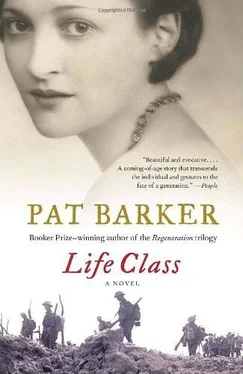The trouble is, I’ve acquired a room mate. Hut mate, I suppose I should say. He’s perfectly pleasant, young, enthusiastic, full of admirable qualities — and he’s driving me mad. Partly it’s that I don’t take kindly to sharing a bedroom with anybody — only child, didn’t go to boarding school, etc. I find the sound of somebody else’s breathing intensely irritating. It stops me sleeping. Oh, and everything’s new to him. Every impression of the hospital, the wounds, the gangrene, the amputated limbs stacked up outside — so of course I start seeing it all again through his eyes, whereas most of the time I go around in a kind of dream state. Like being inside a rubber glove that covers all of you, not just your hands.
I’ve been made more or less responsible for him, I think. And I can’t complain because when I look back now I can see how kind people were to me when I first arrived, how patiently they answered idiotic questions and redid jobs I was supposed to have done.
But. But I can’t draw with him in the room. He looks over my shoulder all the time — pretends not to, but he does. And I can’t lie on my bed, in the evening after we’ve all come back from the café, and say goodnight to your photograph. Can’t talk to it either. All such indulgences are at an end.
What all this has done is to bring forward a little plan I was hatching anyway, which is to hire a room in town. All the tourist trade’s gone. The brass hats are accommodated in hotels or in posh houses overlooking the main square, but in the back streets there are plenty of rooms that used to be let out to summer visitors going very cheap indeed. I think I could get somewhere for about five shillings a week in English money, so that’s my new project. It’s what keeps me going.
I liked your story of your mother and Mrs Bradley and the tourniquet.
Have to go now. I’m writing this early in the morning with Lewis snoring in the next bed — actually he doesn’t snore, he whistles — and he’s showing signs of stirring. It’s time for breakfast anyway. I’m hungry!
Elinor to Paul
Things aren’t good at home. Toby’s gone off to officer training, Mother’s taken to her bed and everybody — by which I mean Father and Rachel and even Toby — thinks I should throw everything up and go home to look after her. I’m the one who isn’t doing anything important, you see. Rachel’s pregnant, Toby’s in the army, Dad’s got his work. All I’ve got is painting, which doesn’t matter and specifically doesn’t matter now. You’d be amazed how many supposedly intelligent people think of art as some frivolrous (sorry, can’t spell it!) distraction from things that really matter. By which of course they mean the war the war the war. Since I’m not involved in any way with that, why can’t I go home and look after Mother?
How’s Tonks? Thinner, gloomier, snappier — at the same time rather splendid, I think. You’d never get that art-doesn’t-matter nonsense out of him. As for the rest, well, the Slade’s almost deserted. Difficult not to speak in a whisper sometimes, you get such a strong sense of people who should be here and aren’t. The men’s life class limps on, but I don’t see how it can keep going much longer. Even the women are beginning to drop away. Ruthie’s nursing — she volunteered the same day as her three brothers enlisted — Marjorie’s talking about leaving, Catherine’s gone. Her father’s been interned, but at least it’s in London and not on the Isle of Man, where a lot of them are sent.
Doesn’t summer seem a long time ago? When I try to think back all I can see is a huge blue-black cloud chasing its own shadow over the shining fields. And I see us on the lawn — Catherine and me — drinking disgusting warm cider from a bucket under the sink that never really kept it cool. All those lovely golden bubbles streaming to the surface and our thoughts flowing with them, though really when I think of the things we talked about. Why do angels wear clothes when they’re free from original sin? Do they have private parts? What do they need them for? Do they even have to have wings? There’s that strange bit in the Bible where two angels come to visit Lot and a crowd gathers outside shouting for them to be brought out so they can ‘know them’. I didn’t realize at first that means ‘have sexual intercourse with’, but of course it does. So obviously they didn’t have wings. They must have been just two extremely beautiful young men. If the Parish Council could have heard us talking about naked angels they’d have thought Catherine’s being a German was the least of their worries. That still makes me angry.
Oh dear, this isn’t a very good letter, I do try. I think what gets in the way is the sense that whatever we do here is so much less important than what you’re doing over there. I can’t imagine your world. You can pop your head back inside mine any time you like, it hasn’t changed much, though now it must feel like a doll’s house to you. Is she still going on about that ? you think. But that was ages ago — decades.
There are changes. When I look down into the quad — where you say you remember Catherine and me walking up and down with our arms around each other’s waists — I see wheelchairs. Men in blue, some with missing legs. Arms as well sometimes. They wheel them here from the hospital on fine days — it’s still quite warm — though I think some of the men look cold. They can’t move around to keep the circulation going and they’re sometimes left out a long time. I walk past them on my way in and again on my way back, and either I walk quickly with my head down or extra slowly and give them a big cheery smile and say hello. I watch them watching me noticing the missing bits, looking at the empty trouser legs or, equally awful, not looking at them. And I feel ashamed. Just being what I am, a girl they might once have asked to dance, is dreadful. I feel I’m an instrument of mental torture through no fault of my own. And then I’m ashamed of feeling that because after all what do my feelings matter? I think the world’s gone completely mad.
I’m looking out of the window now. If I narrow my eyes and make a rainbow with my lashes the men in wheelchairs disappear and I see you as you were last winter in that long black coat of yours. I used to call it your cassock, do you remember? (That was before I knew you better!)
I hope you find a lovely room. It’ll make all the difference to have somewhere quiet where you can draw or read. Paint even.
Write soon. Love, Elinor.
The woman who came to the door looked to be in her early forties, with a clear brown complexion marked by two lines of force from the nose to the corners of her mouth. She kept her left arm folded at the waist, under her pinafore so it bulged out in front of her like a pregnancy.
‘I’ve come about the room,’ he said.
She stood aside to let him in. ‘For you?’
‘Yes, but I wouldn’t be here all the time. I live at the hospital. I’m looking for somewhere to paint.’
If she was surprised she didn’t show it. Instead she led the way upstairs.
‘A lot of steps,’ she said, unnecessarily, on the third floor. He was gasping for breath and they were still climbing. The stairs ended in a door, which opened to reveal a narrow corridor. The floor was covered in dingy brown linoleum and the row of small windows on his left gave hardly any light. He was getting ready to explain why the room was unsuitable when she threw open the door at the end of the corridor. The room was full of light.
As he followed her in, he realized why. They were above the rooftops and there were two windows: one at either end of the room, which was long and narrow, running the width of the house. He went straight to the back window, admiring the sloping roofs, the angles, the sheen of light on grey tiles, the warmth of red brick. He opened the window and a moist green smell came rushing in. Far below was the garden, handkerchief-sized from this height, with a row of outbuildings leaning against the far wall.
Читать дальше












